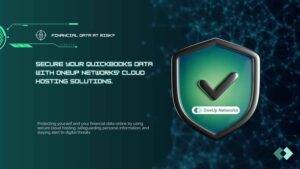As the accounting industry evolves, cloud hosting for tax applications has become a game-changer. Accounting firms are increasingly turning to the cloud to streamline operations, enhance security, and improve collaboration. In this blog, we’ll explore everything accounting firms need to know about cloud hosting for tax software during tax season, including its benefits, how it works, and the specifics of hosting tax software for accountants like Drake Software, Lacerte, ProSeries, and CCH Axcess.
What is Cloud Hosting?
Cloud hosting refers to the practice of storing and accessing software and data on remote servers hosted on the internet, rather than on local servers or personal computers. In the context of tax applications, cloud hosting benefits allows accounting firms to access their tax software and data from anywhere, at any time, using any device with an internet connection.
How Does Cloud Hosting Work for Tax Applications?
When tax applications are hosted on the cloud, the software and its associated data are installed on a secure, remote server. Users access the software via a virtual desktop interface or web browser. Cloud hosting providers like OneUp Networks ensure that the infrastructure is optimized for speed, reliability, and security, allowing accountants to work efficiently without worrying about IT complexities.
Key Features of Cloud Hosting for Tax Applications:
- Centralized Data Access: All files and applications are stored in one secure location, accessible to authorized users.
- Scalability: Resources can be scaled up or down based on business needs.
- Automatic Updates: Software updates and patches are handled by the hosting provider, ensuring compliance and optimal performance.
Key Benefits of Cloud Hosting for Tax Applications
1. Enhanced Accessibility
Cloud hosting enables accounting professionals to access their tax applications and data from anywhere, whether working from the office, home, or on the go. This flexibility is particularly valuable during tax season when workloads peak.
2. Improved Collaboration
Team members can collaborate in real-time, sharing data and insights without delays. Cloud hosting eliminates the need for multiple file versions and ensures everyone is working with the latest information.
3. Cost Efficiency
By hosting tax applications on the cloud, firms can reduce the costs associated with maintaining on-premise servers, hardware upgrades, and IT support. Cloud hosting operates on a subscription model, offering predictable expenses.
4. Robust Security
Cloud hosting providers implement advanced security measures, including:
- Data Encryption: Protecting sensitive client information in transit and at rest.
- Regular Backups: Ensuring data is recoverable in case of accidental loss or cyberattacks.
- Access Controls: Restricting access to authorized personnel only.
5. Compliance with Regulations
Tax season software hosted on the cloud are often compliant with industry standards like SOC 2, HIPAA, and GDPR. This ensures accounting firms meet regulatory requirements without additional effort.
6. Disaster Recovery
Cloud hosting provides robust disaster recovery options, ensuring business continuity even in the event of hardware failures, natural disasters, or cyber incidents.
Addressing Security and Compliance Concerns
Security and compliance are critical for hosting tax season software for accountants while handling sensitive financial data. Leading cloud hosting providers address these concerns through:
- Firewall Protection: Blocking unauthorized access.
- Multi-Factor Authentication (MFA): Adding an extra layer of security.
- Regular Audits: Ensuring compliance with the latest industry standards.
- Dedicated Support: Providing 24/7 monitoring and assistance.

Migrating to the Cloud
Transitioning to cloud hosting may seem daunting, but with the right provider, the process is seamless. Steps include:
- Assessment: Evaluating current IT infrastructure and needs.
- Planning: Developing a migration strategy with minimal disruption.
- Implementation: Transferring applications and data to the cloud.
- Training: Ensuring staff are comfortable with the new system.
Specific Tax Applications and Cloud Hosting
1. Cloud Hosting for Drake Software
Drake Software is a popular choice for tax professionals. Hosting it on the cloud ensures faster processing, enhanced security, and the ability to work from anywhere. Firms can also integrate additional tools to streamline workflows.
2. Cloud Hosting for Lacerte Tax Season Software
Lacerte’s comprehensive features make it ideal for complex tax scenarios. Cloud hosting allows accountants to harness its full potential without worrying about local system limitations.
3. Cloud Hosting for ProSeries Tax Software
ProSeries users benefit from hosting tax software for accountants through improved collaboration, faster performance, and secure data handling. Hosting also ensures compatibility with third-party integrations.
4. Cloud Hosting for CCH Axcess
CCH Axcess is designed for firms seeking a complete tax and accounting solution. Cloud hosting enhances its capabilities, offering better accessibility and security.
5. Cloud Hosting for Other Applications
- QuickBooks: Cloud hosting for QuickBooks allows seamless integration with tax season software and real-time collaboration.
- TaxAct: Hosting TaxAct on the cloud ensures secure and efficient tax preparation.
- UltraTax CS: Cloud hosting improves performance and data sharing capabilities.
Facts and Figures Supporting Cloud Hosting Adoption
- According to a report by MarketsandMarkets, the global cloud computing market is expected to grow from $545.8 billion in 2022 to $1,240.9 billion by 2027, at a CAGR of 17.9%.
- Accounting firms that adopt cloud solutions report a 30% reduction in IT costs and a 20% increase in operational efficiency.
FAQs
1. What is the cost of hosting tax software for accountants?
The cost varies depending on the number of users, storage requirements, and software hosted. Most providers offer flexible pricing plans.
2. How secure is cloud hosting for tax applications?
Reputable providers implement advanced security measures, including encryption, regular backups, and multi-factor authentication.
3. Can I integrate other software with my hosted tax applications?
Yes, cloud hosting supports integrations with accounting software, CRM tools, and more.
4. What happens if I face technical issues?
Most providers offer 24/7 technical support to resolve issues promptly.
5. How long does it take to migrate to the cloud?
The timeline depends on the complexity of the migration but typically ranges from a few days to a couple of weeks.
Conclusion
Cloud hosting for tax applications is no longer a luxury but a necessity for modern accounting firms. It offers unmatched flexibility, enhanced security, and significant cost savings, enabling firms to focus on delivering exceptional client services. By partnering with a reliable provider like OneUp Networks, accounting professionals can overcome traditional IT challenges and unlock the full potential of their tax software. Whether it’s Drake, Lacerte, ProSeries, or CCH Axcess, hosting on the cloud ensures optimal performance, compliance, and scalability. Embrace the cloud today and position your firm for success in an increasingly digital world.












